Module 8 Accidents 模块复习课件(共28张PPT)
文档属性
| 名称 | Module 8 Accidents 模块复习课件(共28张PPT) |
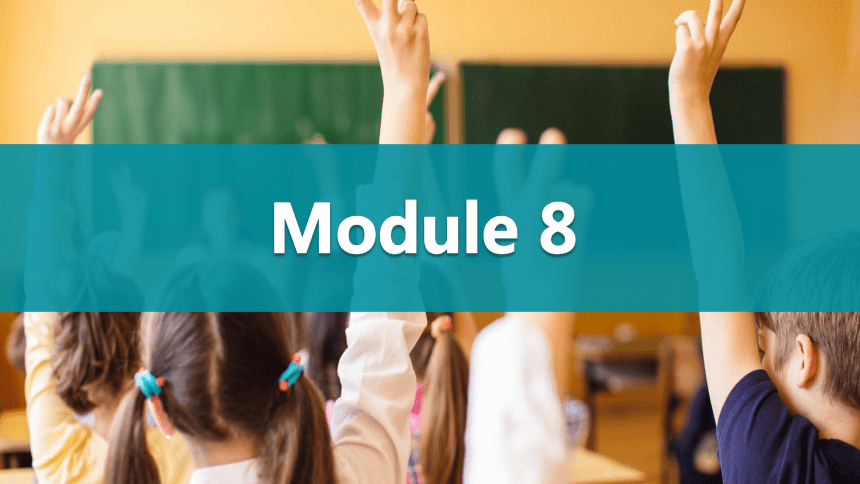
|
|
| 格式 | pptx | ||
| 文件大小 | 2.5MB | ||
| 资源类型 | 教案 | ||
| 版本资源 | 外研版 | ||
| 科目 | 英语 | ||
| 更新时间 | 2021-11-27 00:00:00 | ||
图片预览

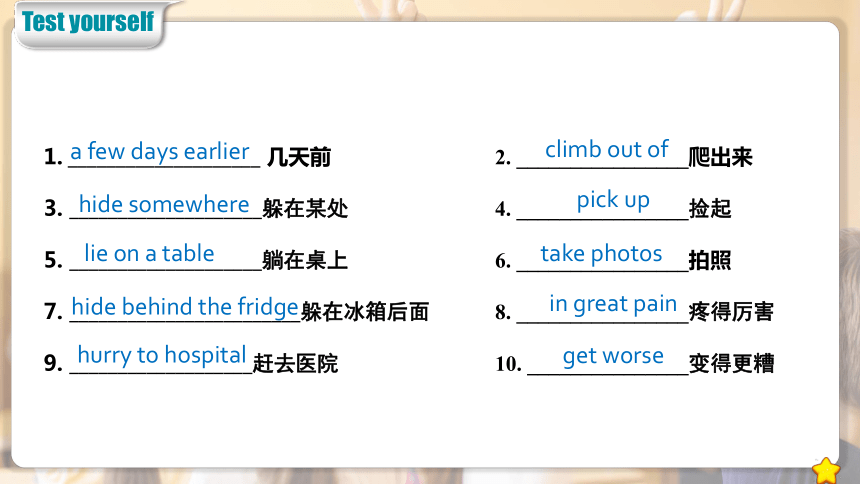

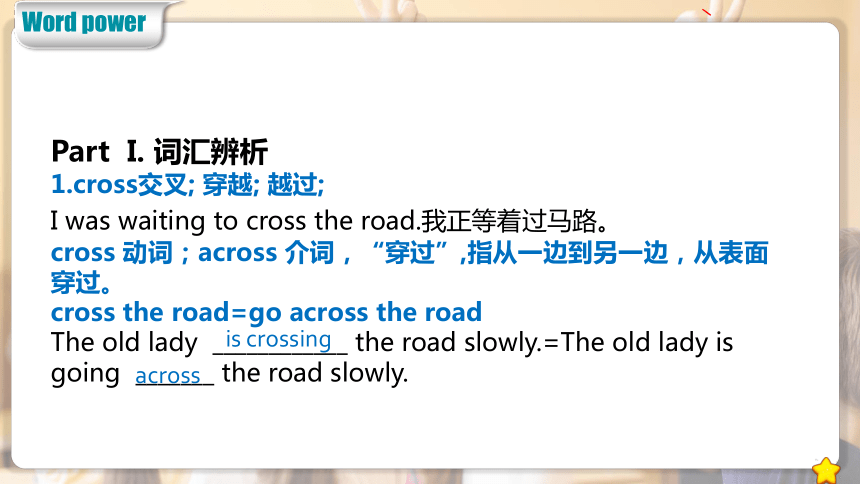
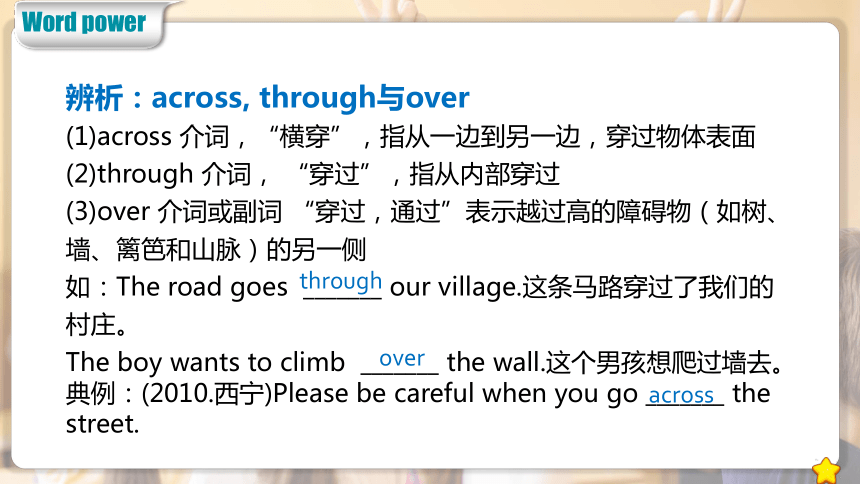
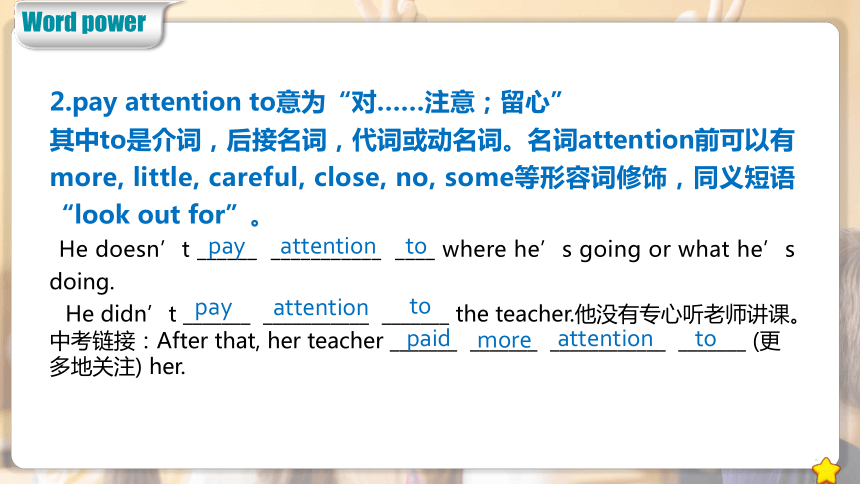
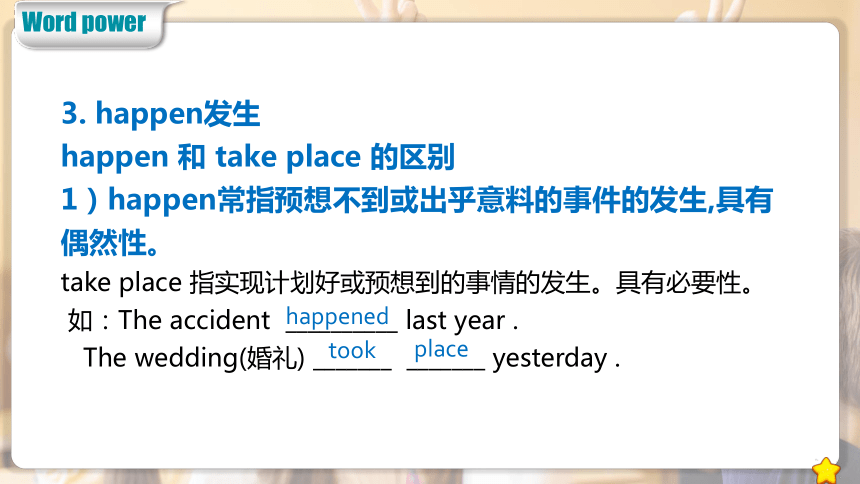

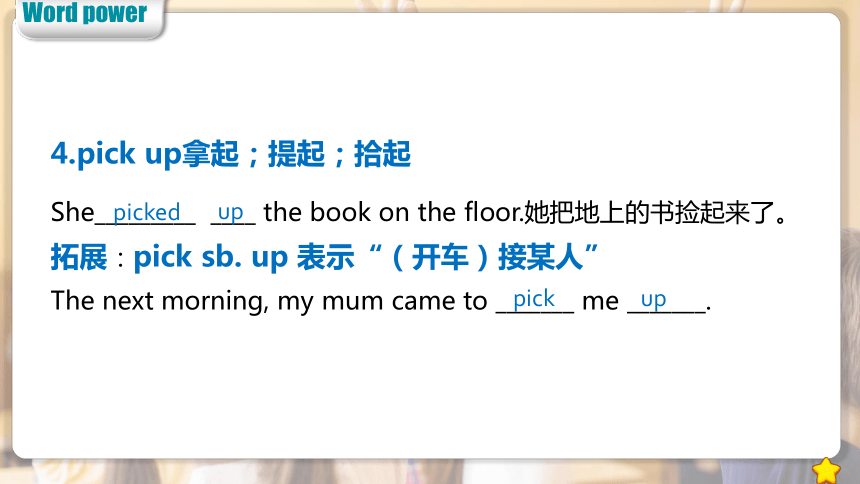
文档简介
(共28张PPT)
Module 8
2
Test yourself
____________________ 几天前 2. ________________爬出来
3. ____________________躲在某处 4. ________________捡起
5. ____________________躺在桌上 6. ________________拍照
7. ________________________躲在冰箱后面 8. ________________疼得厉害
9. ___________________赶去医院 10. _______________变得更糟
a few days earlier
climb out of
hide somewhere
pick up
lie on a table
take photos
hide behind the fridge
hurry to hospital
in great pain
get worse
Word Power
2
Word power
Part I. 词汇辨析
1.cross交叉; 穿越; 越过;
I was waiting to cross the road.我正等着过马路。
cross 动词;across 介词,“穿过”,指从一边到另一边,从表面穿过。
cross the road=go across the road
The old lady ____________ the road slowly.=The old lady is going _______ the road slowly.
is crossing
across
2
Word power
辨析:across, through与over
(1)across 介词,“横穿”,指从一边到另一边,穿过物体表面
(2)through 介词, “穿过”,指从内部穿过
(3)over 介词或副词 “穿过,通过”表示越过高的障碍物(如树、墙、篱笆和山脉)的另一侧
如:The road goes _______ our village.这条马路穿过了我们的村庄。
The boy wants to climb _______ the wall.这个男孩想爬过墙去。
典例:(2010.西宁)Please be careful when you go _______ the street.
through
over
across
2
Word power
2.pay attention to意为“对……注意;留心”
其中to是介词,后接名词,代词或动名词。名词attention前可以有more, little, careful, close, no, some等形容词修饰,同义短语 “look out for”。
He doesn’t ______ ___________ ____ where he’s going or what he’s doing.
He didn’t _______ ___________ _______ the teacher.他没有专心听老师讲课。
中考链接:After that, her teacher _______ _______ ____________ _______ (更多地关注) her.
pay
attention
to
pay
attention
to
paid
attention
to
more
2
Word power
3. happen发生
happen 和 take place 的区别
1)happen常指预想不到或出乎意料的事件的发生,具有偶然性。
take place 指实现计划好或预想到的事情的发生。具有必要性。
如:The accident __________ last year .
The wedding(婚礼) _______ _______ yesterday .
happened
took
place
2
Word power
2)happen的三种用法:
(1)“sth.+happened+地点/时间”意为:“某地/某时发生了某事”
如:An accident ____________ in that street .
(2) “sth.+happened to + sb.”意为“某人发生了某事”(常指不好的事发生在某人身上)
如:A traffic accident _____________ _____ him yesterday .
(3) “sb happened to do sth.”意为“某人碰巧做某事”
如:I _____________ ____ meet her in the street .
典例:Yesterday,an accident ______________(发生) in that road.
happened
happened
to
happened
to
happened
2
Word power
4.pick up拿起;提起;拾起
She_________ ____ the book on the floor.她把地上的书捡起来了。
拓展:pick sb. up 表示“(开车)接某人”
The next morning, my mum came to _______ me _______.
picked
up
pick
up
2
Word power
5. wait等待
(1) wait for +sb./sth./“ 等候……”, for是介词。
wait for me 等候我
wait for a bus等公交车
wait for about twenty minutes 等了大约20分钟
2
Word power
(2) wait +时间段+for+sb./sth.
wait a long time for the train(人教版八上Unit 1)等火车等了好久
下面的用法更常见:
wait for sb./sth.+for+时间段
Yesterday I waited for my sister for over an hour.昨天,我等我妹妹等了一个多小时。
2
Word power
(3) wait for sb.to do 等某人做某事
He is _______ _______ me to go to the store together.他正在等我一起去商店。
(4) can't/could't wait to do迫不及待地做某事,等不及做某事
He _______ _______ _______ _______ the door.他迫不及待地打开了门。
(5) 常见短语:wait a minute 等一会儿 wait a moment 等一会儿 just a moment 请稍等
waiting
for
couldn’t
wait
to
open
佳句Style
佳句Style
1. Some kind-hearted people in the park helped him climb out of the hole…
重点:
(1)构词法:形容词+名词+ed——adj.
E.g.
warm-hearted 热心肠的;near-sighted近视的;three-legged三条腿的;one-armed独臂的;cold-blooded冷血的;baby-faced娃娃脸的;white-haired白头发的;blue-eyed蓝眼睛的;heavy-handed笨手笨脚的
佳句Style
1. Some kind-hearted people in the park helped him climb out of the hole…
重点:
(2) help sb. (to) do sth. 帮助某人做某事
She ____________ him _____________ some new clothes.
她帮他挑了一些新衣服。
helped
choose
佳句Style
2. I always told him to be careful, but he did not listen to me. After the two accidents, he promised to take my advice.
重点:
(1) tell sb. to do sth. 指示某人做某事
I kept __________myself ___ _______calm.
我不断叮嘱自己要保持冷静。
telling
to
keep
佳句Style
2. I always told him to be careful, but he did not listen to me. After the two accidents, he promised to take my advice.
重点:
(2) promise to do sth. 承诺做某事
‘_________ _____ ____ ______ anyone!’ ‘I promise.’
“你要保证不告诉别人!” “我保证。”
Promise
to
not
tell
佳句Style
2. I always told him to be careful, but he did not listen to me. After the two accidents, he promised to take my advice.
重点:
(3) take sb’s advice 采纳某人的建议
He ______ _____ ___________ ___________and went on a low-fat diet.
他听从他的医生的建议﹐采取了低脂饮食。
took
doctor’s
his
advice
佳句Style
3. A few months ago, a car hit him while he was on his way home from school. The driver was a bit tired…
重点:
(1) on the/one’s way 在路上
He stopped for breakfast _____ ______ ______.
他中途停下吃早点。
辨析:by the way 顺便说
What's the time, ____ _____ ______ 顺便问一句,几点钟了?
on
way
the/his
by
way
the
佳句Style
3. A few months ago, a car hit him while he was on his way home from school. The driver was a bit tired…
重点:
(2) a bit 副词短语,表示“一点”
These shoes are ____ ______ tight.
这鞋有点儿紧。
a
bit
佳句Style
4.what else?还有什么?
else不可以做前置定语,用于疑问词或不定代词something, everything, anything, somebody, nobody等之后。
I don’t want _________ _______, thanks. 我不要别的东西了,谢谢。
_________ ______ did you go 你还去过别的什么地方?
典例:
--Would you like __________ _______ to drink
--Yes, I’d like a cup of coffee.
anything
else
Where
else
something
else
Grammar Focus
Grammar Focus
Grammar Focus
过去进行时
过去时均可以和when, while, as引导的过去时间状语从句连用,形成复合句。
when, while, as都可以引导时间状语从句,但是用法区别很大。
Grammar Focus
(一)when 所引导的时间状语,既可以是时间点,也可以是时间段,可以和延续性动词连用,也可以和短暂性动词连用;而while和as引导的时间状语只是时间段,只能和延续性动词连用。
1.Why do you want a new job when you have got such a good one already (get为短暂性动词)
你已经找到如此好的工作,为何还想再找新的?
2.Sorry, I was out when you called me. (call为短暂性动词)
对不起,你打电话时我刚好外出了。
Grammar Focus
3.Strike while the iron is hot. (is为延续性动词,表示一种持续的状态)
趁热打铁。
4.The students took notes as they listened.(listen为延续性动词)
学生们边听课边做笔记。
Grammar Focus
(二)when从句的谓语动词可以在主句谓语动作之前、之后或同时发生;while和as从句的谓语动作必须是和主句谓语动作同时发生。
1.从句动作在主句动作之前发生,只用when。
①When he had finished his homework, he took a short rest. (finished先发生)
当他完成作业后,他休息了一会儿。
②When I got to the airport, the guests had left. (got to后发生)
当我赶到机场时,客人们已经离开了。
Grammar Focus
2.从句动作和主句动作同时发生,且从句动作为延续性动词时,when, while, as都可使用。
①When / While / As we were dancing, a stranger came in. (dance为延续性动词)
当我们跳舞时,一位陌生人走了进来。
②When / While / As she was making a phone call, I was writing a letter. (make为延续性动词)
当她在打电话时,我正在写信。
Module 8
2
Test yourself
____________________ 几天前 2. ________________爬出来
3. ____________________躲在某处 4. ________________捡起
5. ____________________躺在桌上 6. ________________拍照
7. ________________________躲在冰箱后面 8. ________________疼得厉害
9. ___________________赶去医院 10. _______________变得更糟
a few days earlier
climb out of
hide somewhere
pick up
lie on a table
take photos
hide behind the fridge
hurry to hospital
in great pain
get worse
Word Power
2
Word power
Part I. 词汇辨析
1.cross交叉; 穿越; 越过;
I was waiting to cross the road.我正等着过马路。
cross 动词;across 介词,“穿过”,指从一边到另一边,从表面穿过。
cross the road=go across the road
The old lady ____________ the road slowly.=The old lady is going _______ the road slowly.
is crossing
across
2
Word power
辨析:across, through与over
(1)across 介词,“横穿”,指从一边到另一边,穿过物体表面
(2)through 介词, “穿过”,指从内部穿过
(3)over 介词或副词 “穿过,通过”表示越过高的障碍物(如树、墙、篱笆和山脉)的另一侧
如:The road goes _______ our village.这条马路穿过了我们的村庄。
The boy wants to climb _______ the wall.这个男孩想爬过墙去。
典例:(2010.西宁)Please be careful when you go _______ the street.
through
over
across
2
Word power
2.pay attention to意为“对……注意;留心”
其中to是介词,后接名词,代词或动名词。名词attention前可以有more, little, careful, close, no, some等形容词修饰,同义短语 “look out for”。
He doesn’t ______ ___________ ____ where he’s going or what he’s doing.
He didn’t _______ ___________ _______ the teacher.他没有专心听老师讲课。
中考链接:After that, her teacher _______ _______ ____________ _______ (更多地关注) her.
pay
attention
to
pay
attention
to
paid
attention
to
more
2
Word power
3. happen发生
happen 和 take place 的区别
1)happen常指预想不到或出乎意料的事件的发生,具有偶然性。
take place 指实现计划好或预想到的事情的发生。具有必要性。
如:The accident __________ last year .
The wedding(婚礼) _______ _______ yesterday .
happened
took
place
2
Word power
2)happen的三种用法:
(1)“sth.+happened+地点/时间”意为:“某地/某时发生了某事”
如:An accident ____________ in that street .
(2) “sth.+happened to + sb.”意为“某人发生了某事”(常指不好的事发生在某人身上)
如:A traffic accident _____________ _____ him yesterday .
(3) “sb happened to do sth.”意为“某人碰巧做某事”
如:I _____________ ____ meet her in the street .
典例:Yesterday,an accident ______________(发生) in that road.
happened
happened
to
happened
to
happened
2
Word power
4.pick up拿起;提起;拾起
She_________ ____ the book on the floor.她把地上的书捡起来了。
拓展:pick sb. up 表示“(开车)接某人”
The next morning, my mum came to _______ me _______.
picked
up
pick
up
2
Word power
5. wait等待
(1) wait for +sb./sth./“ 等候……”, for是介词。
wait for me 等候我
wait for a bus等公交车
wait for about twenty minutes 等了大约20分钟
2
Word power
(2) wait +时间段+for+sb./sth.
wait a long time for the train(人教版八上Unit 1)等火车等了好久
下面的用法更常见:
wait for sb./sth.+for+时间段
Yesterday I waited for my sister for over an hour.昨天,我等我妹妹等了一个多小时。
2
Word power
(3) wait for sb.to do 等某人做某事
He is _______ _______ me to go to the store together.他正在等我一起去商店。
(4) can't/could't wait to do迫不及待地做某事,等不及做某事
He _______ _______ _______ _______ the door.他迫不及待地打开了门。
(5) 常见短语:wait a minute 等一会儿 wait a moment 等一会儿 just a moment 请稍等
waiting
for
couldn’t
wait
to
open
佳句Style
佳句Style
1. Some kind-hearted people in the park helped him climb out of the hole…
重点:
(1)构词法:形容词+名词+ed——adj.
E.g.
warm-hearted 热心肠的;near-sighted近视的;three-legged三条腿的;one-armed独臂的;cold-blooded冷血的;baby-faced娃娃脸的;white-haired白头发的;blue-eyed蓝眼睛的;heavy-handed笨手笨脚的
佳句Style
1. Some kind-hearted people in the park helped him climb out of the hole…
重点:
(2) help sb. (to) do sth. 帮助某人做某事
She ____________ him _____________ some new clothes.
她帮他挑了一些新衣服。
helped
choose
佳句Style
2. I always told him to be careful, but he did not listen to me. After the two accidents, he promised to take my advice.
重点:
(1) tell sb. to do sth. 指示某人做某事
I kept __________myself ___ _______calm.
我不断叮嘱自己要保持冷静。
telling
to
keep
佳句Style
2. I always told him to be careful, but he did not listen to me. After the two accidents, he promised to take my advice.
重点:
(2) promise to do sth. 承诺做某事
‘_________ _____ ____ ______ anyone!’ ‘I promise.’
“你要保证不告诉别人!” “我保证。”
Promise
to
not
tell
佳句Style
2. I always told him to be careful, but he did not listen to me. After the two accidents, he promised to take my advice.
重点:
(3) take sb’s advice 采纳某人的建议
He ______ _____ ___________ ___________and went on a low-fat diet.
他听从他的医生的建议﹐采取了低脂饮食。
took
doctor’s
his
advice
佳句Style
3. A few months ago, a car hit him while he was on his way home from school. The driver was a bit tired…
重点:
(1) on the/one’s way 在路上
He stopped for breakfast _____ ______ ______.
他中途停下吃早点。
辨析:by the way 顺便说
What's the time, ____ _____ ______ 顺便问一句,几点钟了?
on
way
the/his
by
way
the
佳句Style
3. A few months ago, a car hit him while he was on his way home from school. The driver was a bit tired…
重点:
(2) a bit 副词短语,表示“一点”
These shoes are ____ ______ tight.
这鞋有点儿紧。
a
bit
佳句Style
4.what else?还有什么?
else不可以做前置定语,用于疑问词或不定代词something, everything, anything, somebody, nobody等之后。
I don’t want _________ _______, thanks. 我不要别的东西了,谢谢。
_________ ______ did you go 你还去过别的什么地方?
典例:
--Would you like __________ _______ to drink
--Yes, I’d like a cup of coffee.
anything
else
Where
else
something
else
Grammar Focus
Grammar Focus
Grammar Focus
过去进行时
过去时均可以和when, while, as引导的过去时间状语从句连用,形成复合句。
when, while, as都可以引导时间状语从句,但是用法区别很大。
Grammar Focus
(一)when 所引导的时间状语,既可以是时间点,也可以是时间段,可以和延续性动词连用,也可以和短暂性动词连用;而while和as引导的时间状语只是时间段,只能和延续性动词连用。
1.Why do you want a new job when you have got such a good one already (get为短暂性动词)
你已经找到如此好的工作,为何还想再找新的?
2.Sorry, I was out when you called me. (call为短暂性动词)
对不起,你打电话时我刚好外出了。
Grammar Focus
3.Strike while the iron is hot. (is为延续性动词,表示一种持续的状态)
趁热打铁。
4.The students took notes as they listened.(listen为延续性动词)
学生们边听课边做笔记。
Grammar Focus
(二)when从句的谓语动词可以在主句谓语动作之前、之后或同时发生;while和as从句的谓语动作必须是和主句谓语动作同时发生。
1.从句动作在主句动作之前发生,只用when。
①When he had finished his homework, he took a short rest. (finished先发生)
当他完成作业后,他休息了一会儿。
②When I got to the airport, the guests had left. (got to后发生)
当我赶到机场时,客人们已经离开了。
Grammar Focus
2.从句动作和主句动作同时发生,且从句动作为延续性动词时,when, while, as都可使用。
①When / While / As we were dancing, a stranger came in. (dance为延续性动词)
当我们跳舞时,一位陌生人走了进来。
②When / While / As she was making a phone call, I was writing a letter. (make为延续性动词)
当她在打电话时,我正在写信。
同课章节目录
- Module 1 How to learn English
- Unit 1 Let's try to speak English as much as possi
- Unit 2 You should smile at her.
- Unit 3 Language in use .
- Module 2 My home town and my country
- Unit 1 It's taller than many other buildings.
- Unit 2 Cambridge is a beautiful city in the east o
- Unit 3 Language in use .
- Module 3 Sports.
- Unit 1 Nothing is more exciting than playing tenni
- Unit 2 This year we training more carefully.
- Unit 3 Language in use .
- Module 4 Planes, ships and trains .
- Unit 1 He lives the farthest from school.
- Unit 2 What is the best way to travel.
- Unit 3 Language in use .
- Module 5 Lao She Teahouse.
- Unit 1 I wanted to see the Beijing Opera.
- Unit 2 It descibes the changes in Chinese society.
- Unit 3 Language in use .
- Module 6 Animals in danger.
- Unit 1 It allows people to get closer to them .
- Unit 2 The WWF is working hard to save them all.
- Unit 3 Language in use .
- Revision module A
- Module 7 A famous story
- Unit 1 Alice was sitting with her sister by the ri
- Unit 2 She was thinking about her cat.
- Unit 3 Language in use .
- Module 8 Accidents
- Unit 1 While the car were changing to red, a car s
- Unit 2 I was trying to pick it up when it bite me
- Unit 3 Language in use .
- Module 9 Population
- Unit 1 The population of China is about 1.37 billi
- Unit 2 Arnwick was a city with 200,000 people.
- Unit 3 Language in use .
- Module 10 The weathe
- Unit 1 It might snow.
- Unit 2 The weather is fine all year round.
- Unit 3 Language in use .
- Module 11 Way of life
- Unit 1 In China ,we open a gift later.
- Unit 2 In England, you usually drink tea with milk
- Unit 3 Language in use .
- Module 12 Help
- Unit 1 What should we do before help arrives?
- Unit 2 Stay away from windows and heavy furniture.
- Unit 3 Language in use .
- Revision module B
